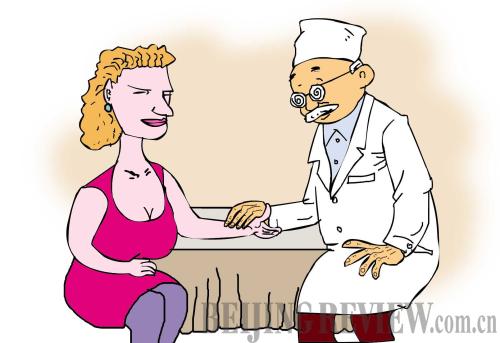|
 |
|
(LI SHIGONG) |
"To become a doctor is like becoming a bomb expert: It takes a long time to learn this skill; you must use care and intuition; and you must understand that your work has grave consequences for those around you," said Amgalan Gamazhapov, an advanced medical student who studies traditional Chinese and Mongolian medicine at the Inner Mongolia Medical University. In 2007 this medical university expanded, opening a state of the art campus just outside of Hohhot City. Since 1999, the Chinese Government has established scores of Mongolian medicine hospitals, including 41 in Inner Mongolia, three in Xinjiang Uygur Autonomous Region and one each in Liaoning, Heilongjiang, Gansu and Qinghai provinces.
"China has always supported traditional medicine," Amgalan continued. "But it wasn't until the 1950s that Western techniques entered. In 2007, the Chinese Government again reaffirmed its commitment to traditional medical practices. That includes Chinese, Mongolian, Tibetan and Indian medicine. I'm here with my family because the doctors and the facilities are excellent."
As he carefully took my pulse on both hands, I recalled that parts of Mongolian medicine rest upon Indian ayurvedic philosophy because India is the home of Buddhism, and Mongolian doctors are Buddhist.
"I can feel that you have long finished with your woman's change," he said.
"Yes," I replied, "But how can you tell?"
"I listened to your pulse. It travels throughout your body and it's possible to glean much information. Your pulse tells me that you have some lower back pain, on the third to last vertebrae. Am I right?" He touched the sore area, which hurt in winter.
"Yes, you're right," I affirmed. "Amazing!"
"Traditional medicine is practical and intuitive," Amgalan continued. "Every organism has many veins, so I listen to how the blood flows in different areas. I can feel if you have high blood pressure or problems in your organs. Traditional medicine tries to help enhance circulation; this creates a healthier energy balance. Western doctors correct problems with drugs, but Chinese and Mongolian medicine is holistic. If you have a stomachache, we want to know why you got this pain, not just simply mask it. We cure the symptom—not just the hurt."
Amgalan then proceeded to give me a soothing medical massage. As he rubbed my back, he explained the philosophy of traditional medicine. Medicine is linked to religious practices among the Mongolian and Chinese healers. "In Buddhist philosophy, we feel that thoughts, moods and preferences can generate reasons for sickness to appear in the body. Buddhist philosophy states that three things are the cores of sickness: ignorance, desire, and evil. Ignorance means going out in the cold without dressing warmly. Desire means allowing your emotions to take over your rational sense, causing actions that are harmful to the body: too much food, taking drugs, etc. Evil means harboring negative thoughts, which materialize into negative illnesses."
Buddhists believe in karma. "You can get sick from something that happened to you in a previous life; sometimes Western doctors diagnose this as genetic disease," Amgalan said. "You can have bad karma in this life, too. Europeans ignore what we translate as a 'soul wound'—they think we are being superstitious and irrational, but the heart and mind impact your body. That's why we want to know about a patient's family, history, friends, food, action, lifestyle—to make a good diagnosis. Western doctors don't take time for that kind of inventory."
Traditional doctors ask about their patient's desires. They examine life conditions, and ask questions to determine how much practical sense a person has in daily life. After an extensive interview, they check the body's reflexes and look carefully at the tongue and eyes. Then they take the pulse, in a way much more sophisticated than Western doctors.
"I will never earn the money Western doctors make," Amgalan remarked. "But I don't want it. I studied as a lama during my early years at university. I'm a Buddhist. I chose to be a doctor. My religious philosophy says that it is good to try to help others. I think our body is a T-shirt for our time in the world. We have to take care of it, keep it clean and fresh, and live in it until we go to the next world. That's very hard to do these days, because the modern world, with all its technological advances, offers loud noises, junk food and empty things, like television sitcoms."
As he talked and massaged my spine, I understood that traditional medical philosophy, like Indian yoga, was about seeking balance. "We must listen to our head, our heart, and our body," he explained. People allow themselves to fall out of balance because of desire and ambition. Our body influences our thoughts. Sometimes the body is strong so consequences come later, but it's always related."
The author is an American living in Beijing |
